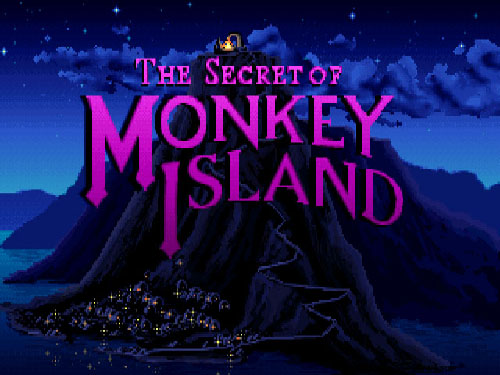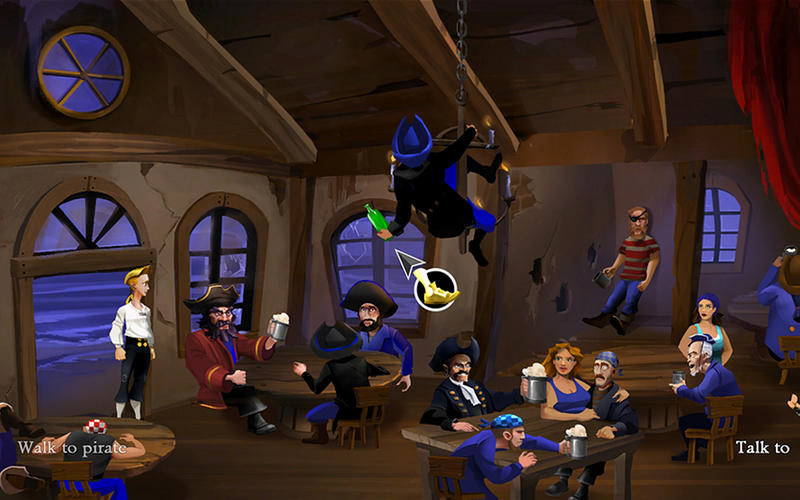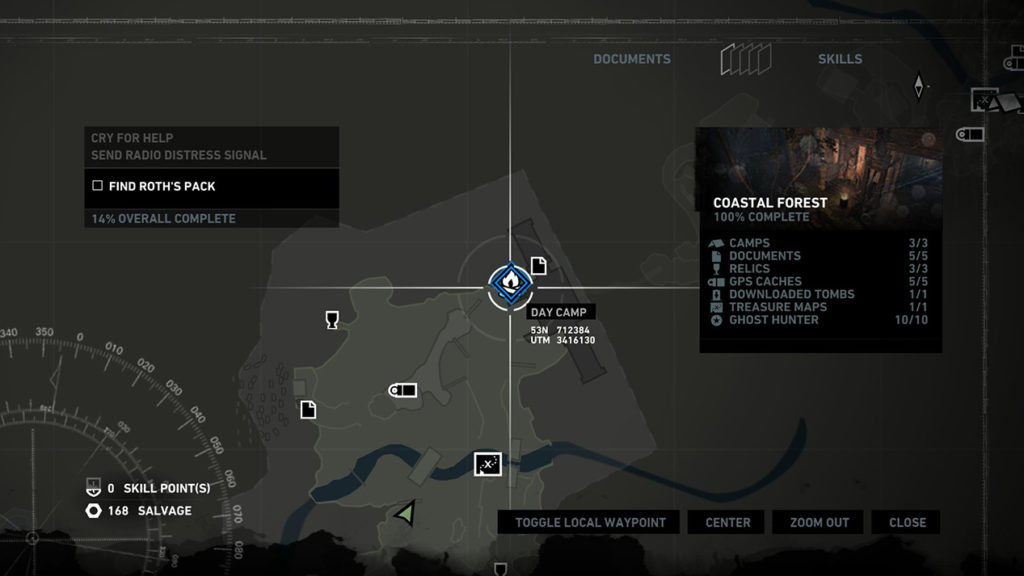I have no idea why, out of all the games I could play, that I am currently playing The Secret of Monkey Island, but life can be weird sometimes.

Some background: I never owned a PC until the year 2000; as a result, I am almost purely a console gamer, though obviously recent years forced me onto the personal computer. It’s hard to argue against the convenience of Steam and its ilk, after all! Because of that lack of “PC games” in particular, I missed a great deal of the various genres that any person would immediately associate with the platform – adventure games are something I’ve never really played or thought about in-depth. Consoles were never well-suited to the formula, and thus I never really played any of the myriad “bad” PC adventure ports to various consoles. Heck, I’ve even managed to avoid playing any Telltale Games, if you can believe that!
Thus, with the vague recommendation of Ron Gilbert’s Monkey Island being a stalwart classic, and the fact that I happened to own it, made me give the game a try via its Remastered Special Something Or Other Edition (no idea how to turn the classic graphics on, so I’m stuck with it). So, what do I think of it?
First, adventure games contain what I’d call a certain set of mechanical interplays that I don’t quite understand. In this game, at least, you mostly pick up objects from places, figure out what object helps you solve what puzzle, and then proceed to find the correct sequence of events that, logically, solves all the problems in your path. In the first two hours of the game so far, just for example, you needed to get into the kitchen behind the tavern, pick up a pot, a fish, and a hunk of meat. All of these items prove useful to you in some way, but the game never directly states this. You also need a sword and a shovel, which requires you to obtain currency, which also consists of an elaborate series of events to get there. In quick summary: apparently old adventure games demanded a strict, yet somewhat convoluted, series of events.

I suppose you could call it puzzle solving, but I tend to see them more as riddles and brain-teasers than a traditional block-pushing puzzle or “put the thing in the thing”. Just for example, the troll at the bridge (yes, this game pokes fun at tropes) wants an item. What item? An item that, in his words, “looking for something that would attract attention but of no real purpose importance to anyone.” That’s a riddle, right? Other than that, the game offers virtually no clues. You get three tries to figure out what he wants (though save games make that a moot point…assuming he’s telling the truth, since characters in this game lie). One of the objects is from the kitchen, of which I mentioned 3 items. Can you guess which one in the way that the developers intended?
No? Well, tough luck – spend a while thinking about it and come back. I think that’s primarily the way adventure games were meant to work. Taking the limitations of PC platforms at the time, they presented a series of logic puzzles for players to traverse, and not the sort of things that just CLICK while you’re playing. Time spent outside the game turns into time that actually ends up helping you solve the puzzle. This is a very different design ethos from most video games, especially modern games that never want the player to contemplate something, or get stuck, or anything that might impede their progress. The whole function of adventure games, no matter the story wrapped around those puzzles, is to impede your progress in a non-obvious way that you need to solve with a bit of out-of-the-box brain power.

In part, that’s why adventure games fell out of vogue in the first place, and developers had to change them radically to make them appeal to the masses. As Ron Gilbert tells it:
There is just something about them that is just not resonating as well with the players and I do not really know what that is, to be completely honest. I think players today want to know where to go and what to do and then they want to go do it. If you look at all those first person shooters today, or platformers and so on, they’re telling you what to do and where to go, and then you immediately go and do it. And with adventure games questions like “Where do I go?”, “What do I do?” and then “How do I do it?” are an essential part of the gameplay itself. So it is a completely different progress. Adventure games are also much slower paced and you have those moments of quiet contemplation where you walk around and think about that thing you have in your inventory and so on. It is more about sitting down and being by yourself for a little while.
Actually, the weird part about the answer to the troll puzzle is, in retrospect, that the answer makes perfect sense upon figuring it out. It’s certainly NOT obvious in any way, shape, or form. It takes a bit of thought, the kind of thought that doesn’t take place when you’ve got a hint system feeding you a trail of breadcrumbs to a solution, or a way-point marker tells you where to go. For a person like me, who plays high-octane action-combat games for the most part, getting used to driving so slowly takes a LOT of time. But, the way it proceeds feels fundamentally different than any other video game genre.

There really aren’t a lot of games where you just sorta sit and figure something out, without any prompting or nudging from the video game itself. Sitting and…just, well, thinking was something I did a lot of in graduate school, but it’s been a long time since I just sorta did nothing and though a bunch about how to solve a particular problem presented to me. That’s a weird feeling for a game to give, but I don’t think it’s any less valid. And sure, you can decide to be a brute and “brute force” your way through the solution, although that sort of strategy ultimately isn’t rewarding in any real way. Why bother playing the game at that point? But that’s what makes adventure games interesting: a puzzle with a solution – and hopefully not an arbitrary one. It’s a self-motivated task, far more than the initial game design would indicate – getting frustrated and leaving is part of the experience, haha. But, once you get into it, it’s far more entertaining than my initials assumptions suggested.
In studying the Bible, Joshua 1:8 is one of the most oft-quoted verses:
8 This book of the law shall not depart from your mouth, but you shall meditate on it day and night, so that you may [d]be careful to do according to all that is written in it; for then you will make your way prosperous, and then you will [e]have success.
And in theology, it turns out you do this a whole lot. Contemplation, meditation, whatever you want to call it – we try to answer, or come towards the answer, of questions we have about the Christian faith. Is God a Trinity? How do we deal with the problem of evil, and does theodicy make any sense? How does the salvation of Christ actually work? People throughout two millennia tried to answer these questions in the best way possible. Yet, because there are no definite interpretations, we end up with a host of beliefs across a wide spectrum.
Very intelligent, sincere people spent a great deal of time figuring these things out, not only for other Christians but for themselves. And much of it required long, deep thought. But what lied on the other side was, to put it lightly, worth the pain and effort of getting there, even if the answer wasn’t necessarily a permanent answer. Saint Augustine certainly found joy in the quiet nature of contemplation:
Imagine if all the tumult of the body were to quiet down, along with all our busy thoughts about earth, sea, and air; if the very world should stop, and the mind cease thinking about itself, go beyond itself, and be quite still; if all the fantasies that appear in dreams and imagination should cease, and there be no speech, no sign:
Imagine if all things that are perishable grew still – for if we listen they are saying, We did not make ourselves; he made us who abides forever – imagine, then, that they should say this and fall silent, listening to the very voice of him who made them and not to that of his creation; so that we should hear not his word through the tongues of men, nor the voice of angels, nor the clouds’ thunder, nor any symbol, but the very Self which in these things we love, and go beyond ourselves to attain a flash of that eternal wisdom which abides above all things:
And imagine if that moment were to go on and on, leaving behind all other sights and sounds but this one vision which ravishes and absorbs and fixes the beholder in joy; so that the rest of eternal life were like that moment of illumination which leaves us breathless:
Would this not be what is bidden in scripture, Enter thou into the joy of thy Lord?
Confession, Book 9, Chapter 10
